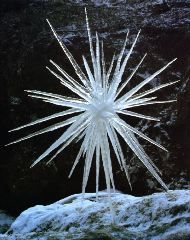I wish to know the behavior of ice at zero gravity, how ice will behave when melted at g=0? Thanks
2 Answers
Water forms close to perfect spheres in zero gravity due to it's surface tension. There's a variety of videos of water in the space station. Ice, assuming you start with one of those balls of water, you have to ask first, would it freeze outside in (say, the temperature of the station is dropped below 0 C), or would it freeze inside-out, say you stick a cold tube in it to freeze it from the inside.
Freezing outside in, it would probobly be similar to an ice cube and like an ice cube, as water freezes it expands but the outside is frozen around it, so you would get cracking and the pushing out you get with ice cubs. Also, any dissolved gas in the water would get trapped as bubbles on the inside, giving it the whitish color we're used to ice cubes being. It would look like a spherical ice cube, with the normal buckles and cracks and the occasional ice spike - (see link below on ice spikes)
https://www.its.caltech.edu/~atomic/snowcrystals/icespikes/icespikes.htm
Now, freezing it inside out, might look quite different as the ice could form crystals and you might get some more geometric shapes, as the non melted water would simply follow the pattern - I don't think you'd get snowflakes but you might get stars or triangles or spikes going in a few directions - that could actually be pretty cool looking.
This picture is artificially made, but freezing inside-out you might get something a little bit like this, probobly not so many spikes:

Source: phttp://blogs.warwick.ac.uk/sbradley/gallerydetail/andy_goldsworthy/?imageNum=4
Also, freezing inside out any dissolved gas would be able to escape and you'd get clear ice, not whiteish ice, like ice used for carving, which is frozen from the bottom up.
scroll to the bottom for "clear ice": http://www.alcademics.com/2014/12/making-a-clear-ice-block-from-the-bottom-up.html
Similarly, ice wouldn't melt any different in Zero G, except that it wouldn't drip, the melting ice would form a sphere around the remaining ice.
And as pointed out above, sound doesn't change much in gravity. It changes in different density of the medium (for example, sound travels faster in water than air, and slower in high altitude), but assuming you have 1 ATM in a sealed container in space, sound would behave pretty much like it does on earth.
I don't understand well the science behind sound breaking glass, but I see no reason why that wouldn't work in Zero G just as well as 1G or 2 G. It wouldn't work nearly as well in 1/2 ATM and would probobly break the glass more easily in 2 ATM - I would think but gravity wouldn't have much effect. It's the structure of the glass that breaks from sound-waves, not the weight of the glass.
-
$\begingroup$ Small point to add - as I've been thinking about it, in gravity, ice floats, so water freezes top down. In space, freezing outside in, the surface tension of water would probobly surround the ice as it freezes - so you wouldn't get round icecubs, but more organic shapes, maybe cloud like shaped ice cubs, cause ice wouldn't simply form on the outside and freeze inward, but it would form and then effectively sink and more water would form around it due to water's tendency to do that in zero G. Freezing water in zero G, assuming 1 ATM, would be interesting to watch. $\endgroup$– userLTKCommented Apr 19, 2015 at 23:17
Sound will behave just like on earth provided it has a medium to travel through (Astronauts on the ISS can communicate normally; watch some videos)
-
-
$\begingroup$ what do you mean by break a closed glass? $\endgroup$ Commented Apr 19, 2015 at 10:08
-
$\begingroup$ I assumed he meant like an opera singer breaking a wine glass by singing at it loudly, but that might have been an incorrect assumption of mine. In that case, I don't think gravity would matter much. It's the vibration that breaks the glass. Being weightless wouldn't change much. $\endgroup$– userLTKCommented Apr 19, 2015 at 12:04
-
$\begingroup$ I would be inclined to agree in that case $\endgroup$ Commented Apr 19, 2015 at 14:59
